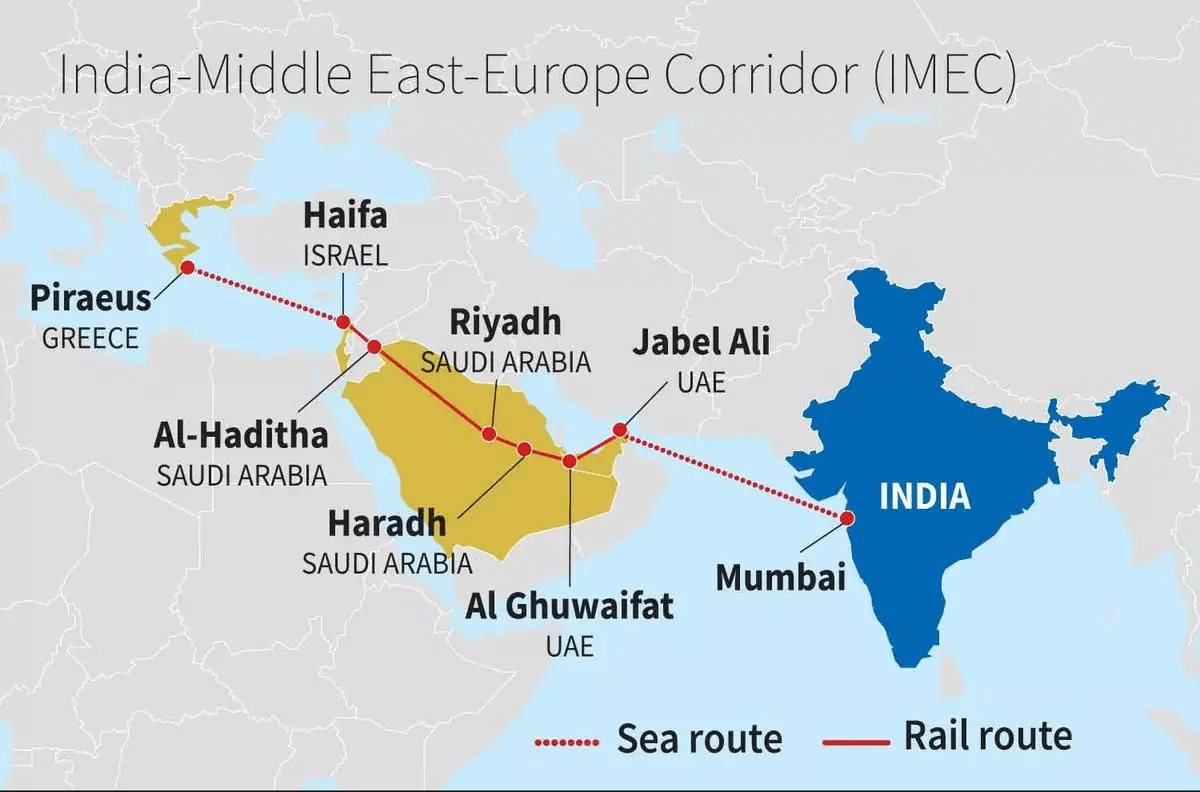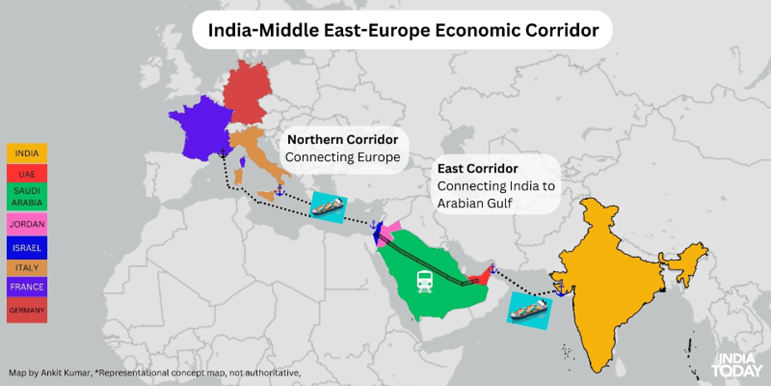The Hindu Analysis
Video
Read Analysis


Headlines
-
PM-PVTG mission - Page No.1 , GS 1
-
The Nobel in economics as a need to course correct - Page
No.6, GS 3
-
Life over death - Page No.6, GS 2,4
-
A grave error in the law - Page No.7 , GS 2
-
FATF team in India to hold on-site review meetings - Page
No. 10 , GS 2
-
The India-Middle East-Europe Economic Corridor (IMEC) -
Page No.12 , GS 2
-
Gold drives trade deficit to new high - Page No.14, GS
3
PM-PVTG mission - Page No.1 , GS 1

- The PM-PVTG Development Mission program aims to improve the socio-economic
status of Vulnerable Tribal Groups (PVTGs). For this, availability of Rs 15.000
crore for Scheduled Tribes has been envisaged in the Union Budget
- The mission includes providing basic facilities like safe housing, clean
drinking water and sanitation, education, health and nutrition, better access to
roads in settlements for backward scheduled tribes.
- It may be noted that Union Finance Minister Nirmala Sitharaman had announced
'Pradhan Mantri PVTG Development Mission' under the Union Budget 2023-24 on
February 1, 2023.
Particularly Vulnerable Tribal Groups (PVTGs):
- The Ministry of Home Affairs has classified 75 tribal groups in 18 states of the
country and the Union Territory of Andaman and Nicobar Islands as Particularly
Vulnerable Tribal Groups (PVTGs).
- PVTGs are the most vulnerable among the tribal groups.
- Initially 52 tribal groups were classified as PVTGs. In the year 1993, 23
additional tribal groups were included in this category, due to which there are
currently 75 tribal groups under PVTG.
- Of the 75 listed PVTGs, the highest number are found in Odisha (13), followed by
Andhra Pradesh (12).
- Dhebar Commission: In 1973, the Commission created Primitive Tribal Groups
(PTGs) as a separate category, which are less developed among tribal groups. In
2006, the Government of India renamed the PTGs as Particular
Vulnerable Tribal Groups (PVTGs).
The Nobel in economics as a need to course correct - Page No.6, GS 3

- Claudia Goldin's well-deserved Nobel Prize win in Economic Sciences, for her
pioneering research on the gender dynamics of labour markets.
- Goldin is only the third woman to win this honor. In 2009, Elinor Ostrom got the
award along with Oliver E Williamson, while in 2019, Esther Duflo shared it with
Abhijit Banerjee and Michael Kremer.
- The Nobel Prize in Economic Sciences was established in 1968 by the Sveriges
Riksbank (the central bank of Sweden) in memory of Alfred Nobel, the inventor of
dynamite and the founder of the Nobel Prizes.
- It is officially called the Sveriges Riksbank Prize in Economic Sciences in
Memory of Alfred Nobel.
- Unlike the original Nobel Prizes in fields like physics, chemistry, medicine,
literature, and peace, which were established by Nobel's will, the Nobel Prize
in Economic Sciences is not one of the original Nobel Prizes.
Life over death - Page No.6, GS 2,4

- It is disappointing that the parliamentary committee that examined the Bharatiya
Nyaya Sanhita (BNS), the proposed criminal statute likely to replace the IPC,
has not made a recommendation to abolish the death penalty.
- Instead, the standing committee on Home Affairs, despite submissions from
experts and jurists on abolition, chose to make a bland recommendation "that the
matter may be left for the government to consider".
- The Court awarded the death penalty to only seven people from 2007 to 2022,
while all death sentences were either set aside or commuted to life in 2023, as
they did not fall under the "rarest of rare cases"
- In 1980, the Supreme Court upheld the constitutionality of capital punishment in
'Bachan Singh v State of Punjab' on the condition that the punishment will be
awarded in the "rarest of the rare" cases.
- According to Amnesty International, 55 countries still have the death sentence
in their statute books.
- Death by hanging is the most prevalent mode of execution, especially in the
former British colonies.
- Execution by firing squad is employed in China.
- Saudi Arabia uses beheading, apart from other methods.
- In the US, an intravenous lethal injection is given in every state (27 states
and American Samoa) that allows the death penalty.
A grave error in the law - Page No.7 , GS 2

- In not finding room for same-sex marriages in the Special Marriage Act, the
Supreme Court misinterpreted the Constitution and failed to look at its own
precedents
- Article 14 guarantees equality and equal protection of the law and Article 15
prohibits discrimination on grounds including sex. The court has held in Navtej
(2018) while decriminalising homosexuality that 'sex' under
Article 15 takes in 'sexual orientation'.
- Separation of powers
- In Visakha v. State of Rajasthan (1997), the court, in the absence of a law,
laid down detailed guidelines for how institutions must deal with complaints of
sexual harassment. In NALSA (2014), the court directed recognition
of the rights of 'third gender persons' and issued elaborate directions for
their protection.
FATF team in India to hold on-site review meetings - Page No. 10 , GS
2

- A Financial Action Task Force (FATF) team is in India as part of the process to
conduct the country's mutual evaluations to ascertain if authorities have put in
place and effectively implemented the required legal framework
against money laundering and terrorist financing.
Financial Action Task Force (FATF):
- FATF is an inter-governmental policy-making and standard-setting body dedicated
to combating money laundering and terrorist financing.
- Objective: To establish international standards, and to develop and
promote policies, both at national and international levels, to combat money
laundering and the financing of terrorism.
- It was established in 1989 during the G7 Summit in Paris to develop policies
against money laundering.
- 2001 its mandate expanded to include terrorism financing.
- Headquarters: Paris, France.
- FATF members include 39 countries, including the United States, India, China,
saudi Arabia, Britain, Germany, France, and the EU as such.
- India became a member of FATE in 2010
- Black List: Countries knowns as Non-Cooperative Countries or Territories
(NCCTs) are put on the blacklist. These countries support terror funding and
money laundering activities. The FATF revises the blacklist
regularly, adding or deleting entries.
- Grey List: Countries that are considered a safe haven for supporting
terror funding and money laundering are put on the FATF grey list. This
inclusion serves as a warning to the country that it may enter the
blacklist.
- Three countries North Korea, Iran, and Myanmar are currently in FATF's
blacklist.
The India-Middle East-Europe Economic Corridor (IMEC) - Page No.12 ,
GS 2



- The proposed IMEC will consist of Railroad, Ship-to-Rail networks and Road
transport routes extending across two corridors, that is,
- The East Corridor - connecting India to the Arabian Gulf,
- The Northern Corridor - connecting the Gulf to Europe.
- The IMEC corridor will also include an electricity cable, a hydrogen pipeline
and a high-speed data cable.
Signatories:
- India, the US, Saudi Arabia, UAE, the European Union, Italy, France, and
Germany.
- Objective:
- It aims to create a comprehensive transportation network, comprising rail, road,
and sea routes, connecting India, the Middle East, and Europe.
- It aims to enhance transportation efficiency, reduce costs, increase economic
unity, generate employment, and lower Greenhouse Gas (GHG) emissions.
- It is expected to transform the integration of Asia, Europe, and the Middle East
by facilitating trade and connectivity.
Gold drives trade deficit to new high - Page No.14, GS 3

- India's goods exports grew only for the second time in 2023-24 in october,
albeit on a low base, rising 6.2% to $33.6 billion, but imports jumped to a
record high of $65.03 billion, 12.3% over last year, fuelled higher
gold inflows.
- Consequently, India's monthly goods trade deficit widened to an all- time high
of $31.46 billion, eclipsing the previous record of $29.23 billion in September
2022. October's outbound shipments' value was also the lowest
since last November, and 2.5% below September's.
- While ministry mandarins attributed a large part of the increase in octber's
imports to a surge in gold imports, which were up 95.4% to $7.2 billion, trade
analysts noted that other items, including oil, electonic and
gems and jewellery, also contributed to the record import bill.










